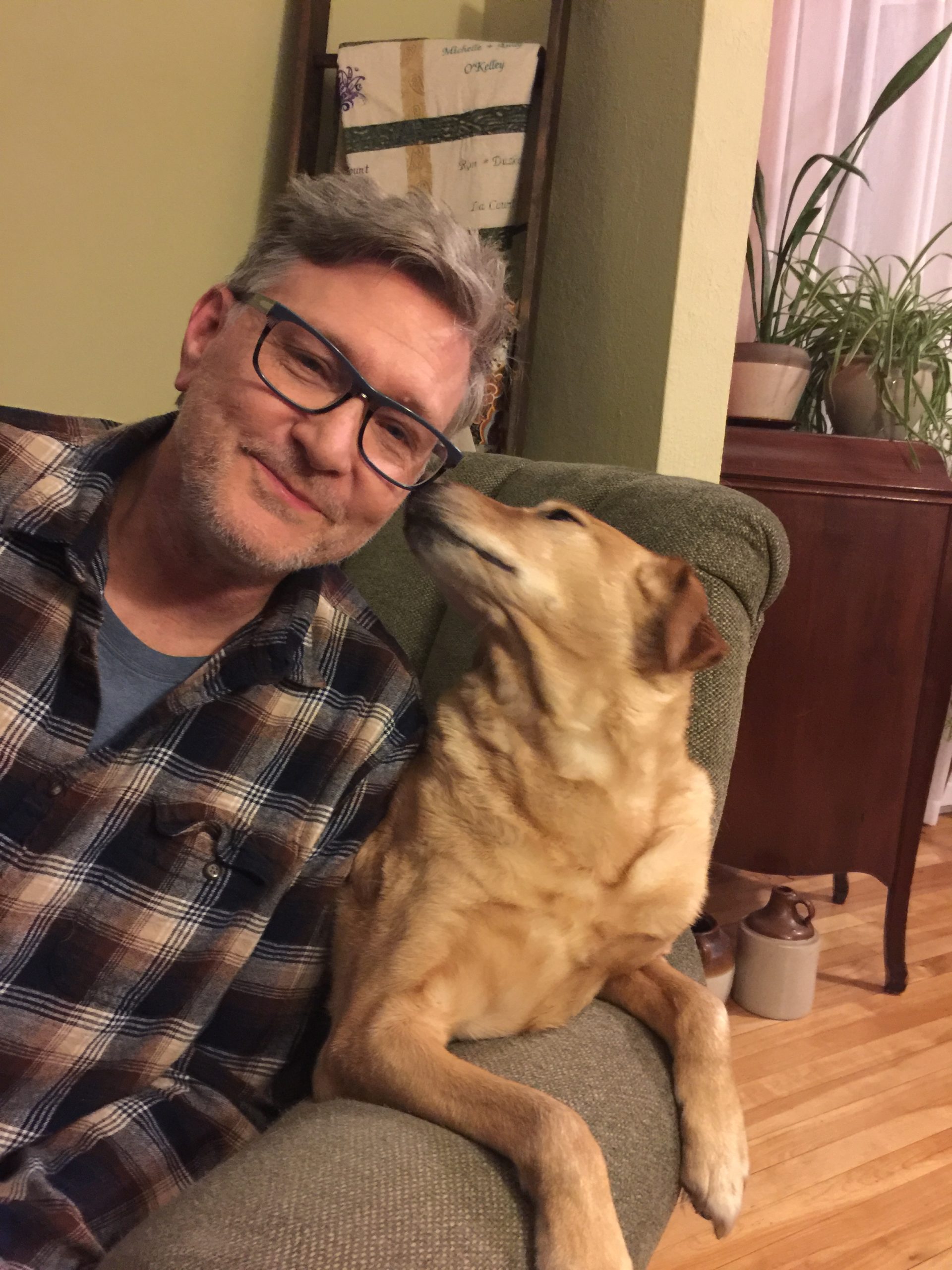Love In the Time of Comcast
He’d made a mistake in coming here. The taxi idled at the curb, one cylinder missing its spark and inciting an anxious, irregular chuff to the rhythm of the engine. Miguel had been calm until suddenly he realized his folly and his blood drained to his ankles. This was the end. Whatever happened next, it was over. The dream would be gone. A lifetime of imagining replaced forever by—
The door hissed open and revealed a few inches of dim interior. A face appeared. The features were changed; plumper, more tan, more textured, yet it was unmistakably Jenny.
Her eyes widened slightly, a practiced smile faltered and then resumed more genuine and curious. A cool draft carried the promise of quiet comfort through the gap in the doorway.
“May I help you?” she said, her voice a huskier overlay on the voice he knew. The years between stretched out, growing immense until Miguel was exhausted. He looked back to the taxi, his mouth moving silently, his hand rising, aimless. The driver glanced up for a beat and then back to his phone. Jenny leaned around him to see, concern working into her brows.
“Is he waiting—” she started to ask. With no breath available to carry his words, Miguel whispered,
“I’m sorry—it’s too hard to explain.” He turned on numbed feet and retreated down the front walk. He closed his eyes and waited for death or dreams or the sputtering cab to take him away.
“Miguel?” she called from the steps, “Aren’t you Miguel?”
He followed her along the path they’d worn into the tall grass, the bottoms of her bare feet dark with summer dirt. She was eight and he was ten and the days unfurled behind a soft scrim of melancholy that would haunt Miguel for the rest of his life. Like photos from the 70’s; his memories played in his mind with the same yellowed, pastel quality. Jenny spread her hands to brush the fuzzy tips of the grass, her pony-tail bouncing, the red rubber band sliding lower as the day wore on, releasing pale strands to the breeze.
“Where we going?” he asked. He was older and the male, but honestly, he didn’t care who led, who followed or what they got up to. They circled around one side of the wide field and down into the shade of a small ravine. The mottled light through the trees winked like stars, insects streaking as comets. They stood in the quiet, listening to the soft chatter of the leaves. They’d hoped for water to wade in but the stream bed was only a muddy gash. Jenny stepped over the creek and pressed her foot into a spot of soft mud. She pulled back to reveal an imprint perfect in every detail; her high narrow arch, the row of small, round toe pads, even the whorls of her skin were visible. Miguel marveled at the tiny replica. He thought for a moment of mounding some rocks around to preserve it but Jenny was moving again and he started uphill after her.
Miguel had joined the Navy too late for Vietnam and enjoyed an uneventful service. He’d married a woman in Guam whose vision of American life, built from 1940’s Hollywood, he could never recreate. They’d returned to Ohio where she’d scowled through four years of disappointment before leaving him for a ballroom dance instructor,
“Big bands!” she’d said, “You give me little house, I need big band!” As if a reproach of his manhood it had stung, but he’d been fine with her leaving.
Then he’d met Marion, a divorcee as well. She’d been a semi-pro golfer with an abusive ex-husband, a bad ankle and no major wins; except his heart. They’d met at a party, set up by friends, which he’d resented for about five minutes, until she spoke to him with her woody, melodic voice. Her warm tone and steady gaze had drawn him in and they’d spent the evening moving closer to each other and further from the rest of the party. He’d walked home later in a blissful fog, his fingers tingling with the muscle memory of warm breasts beneath soft angora. Whether it was love or just the surprise of feeling again, it had carried him into four decades of marriage with the sweet, agreeable woman. Accommodating; even to the cancer that took her breast and then her life one March while he shoveled winter snow and tried to understand his place in this new world.
They’d had a son, a twenty-six-year-old furniture builder who’d insisted that the cancer was “bullshit.” Miguel had not disagreed, but the kid had declared the same of artificial sweeteners, Comcast and junk mail. The world was not “out to get” anyone in particular, Miguel thought later; it didn’t care enough to have an agenda. Still, his son had helped to get Miguel connected online, claiming the email contact was essential and that the internet could “keep him busy”. Though he’d retired the year before, Miguel hadn’t noticed many spare hours of free time cluttering up his day. He warmed to the computer slowly; the email worked well enough, though no one else wrote as formally as his own letter-like correspondences with greetings, closings and punctuation. His grandkids avoided capital letters entirely.
The rest of the internet he found more intimidating. So voyeuristic and yet vastly consumable if he gave in to its lurid appeal; missing only a carnival barker to single him out of a crowd. His son had suggested Facebook and a search of old school friends, something that had appealed to him very little. What did a few casual years of acquaintance during high school mean after forty elapsed years of real life. It was months before he made the connection to Jenny. His mind had simply never connected the childhood friend from the seventies with an actual 21st-century adult. The idea was immediately unsettling. He imagined a middle-aged Jenny peering scornfully out of a screen and into his colorless, irrelevant life. Why would she possibly care now?
He put her out of his mind for weeks, though he eventually checked the profiles of a few other names from his past. One listed Jenny as a friend. He hesitated for a while but the safety of anonymity prevailed and with his heart climbing into his throat, he clicked on her highlighted name.
There was nothing. Or nothing he shouldn’t have expected, so why this sense of disappointment? She was there, a vaguely familiar face among the group photos; picnics, birthdays, a motorcycle camping trip. She had her own life, a life crowded with children and grandchildren. No time to pose alone before the camera. Days and months and years that had nothing to do with him. What had he hoped to find, the faded photos of the past? A smiling eight-year-old welcoming him back from the future? He looked again at the assorted faces, all of them echoes of the one he remembered and he was ashamed of his pathetic desire to conjure up this little girl from the past. He closed the program, embarrassed at his intrusion into their world. He stared at the dark screen, sensing a danger behind his own dull reflection. Too much information might dilute the images in his mind; dissolve his past into the endless river of time that flowed so carelessly along.
Day after summer day, they seemed to need something more, to know something more. So they searched together. One of them would tumble out of the house each morning to find the other milling around expectantly in the yard. Then the day would begin. No school, no television, no games, just a meandering journey through the semi-rural area at the edge of their small town. Fields, woods, barns, an old drive-in theater; all were thoroughly explored. Once, as they sat curled in the mouth of a concrete culvert, making chains from dandelion stems, sliding the smaller upper end of one into the wider base of the next until they wore the purple-green necklaces, Jenny told him about watching her older sister “make out” with a boyfriend. Miguel hesitated.
“You know…kissing,” she said, puckering her lips and then lolling her tongue wildly. She suggested they try it. She hopped across to his side of the tunnel and pressed in close. Her small lips were cool to the touch and soft as petals. Her smile blossomed as she slid her downy arms around his neck. Their own bodies then became part of a day’s exploration.
They’d spent at least one more summer together, Miguel remembered, but the street on which they lived had been the division for the local school districts. Attending two different schools they’d collected separate groups of friends and by high school had lost touch with each other. What had she been doing all these years? How had she changed through the years? How did she look at forty: married, happy, with a successful accounting career, her children leaving home? Or at twenty: pregnant, penniless and shacked up with a drug-dealing boyfriend? What had she looked like as a teenager in high school? He didn’t even know that. What had he looked like? He couldn’t remember.
The next morning, he dug through some boxes in the basement and found an old yearbook. He thumbed through the pages, the black and white photos familiar but lacking relevance, like old movie stills; a staged reality. He found the section of senior photos. Then he was there; smiling out beneath long feathered hair and the ever-present acne. A zippered knit shirt clung tight to his narrow shoulders. In the margins were penned the comments from fellow students. One had been more bold, writing across the page and over a couple of faces: From an old friend who’s been missing you. Don’t you DARE forget me! – Jenny.
He stared at the slanting green ink lines, touched his finger the page, feeling the deep impressions left by the pen. He considered a couple other Jennys from his class—but he knew who it was. Yet didn’t make any sense, they’d lost touch by then. She was not a part of his life at the time he’d graduated. What was he missing? It nagged him for weeks, like a page torn from a book. Then a Navy squad reunion brought him to Florida. Too close to Jenny’s home in Tampa to ignore.
They reached their destination: an old pear tree twisting up stubbornly from the tall grass of the field. Jenny reached for a gnarled hand-hold. Her slender arms trembled and one leg swung loose as she struggled up. Miguel put two hands on her pink corduroy bottom and pushed, boosting her up onto a lower branch. The fruit was turning, the ground littered with sweet, pungent smears of rotting pear, swarming with bees. They would pick a pear from the tree, take a bite and suck quickly at the juice which ran inevitably down their arms and dripped from their elbows. They’d freeze at the arrival of a curious bee or throw the core away as a distraction. Jenny climbed higher into the tree, her loose white tee open from below affording a glimpse of her bare belly and narrow ribs. She was so different from Miguel’s older sister who wore make-up and dresses and did girly things. Yet despite the sweaty upper lip, the dirt-shadowed knees and the scratched shins, she possessed a delicacy that begged his attention.
“Miguel, I know it’s you. You can’t just leave now.” She’d followed him down the walk and laid a hand on his shoulder. “Come inside, please,” she said gently. He stood listening to the laboring of the taxi’s engine. He’d never felt older and suddenly he missed Marion more than ever. She would have navigated this maze of emotions, would have even given her blessing to his ridiculous quest; always the romantic. He sighed, turned around and followed Jenny back up the steps and into the hush of her living room.
After some iced tea and small talk, he relaxed. They talked about times they both remembered, about other events he should have remembered but didn’t. He thought of a couple of things that neither would mention. They glanced at each other, quiet but not uncomfortable and then he asked, finally, about the yearbook message. She looked stunned, her chest lifting in quick, shallow breaths. Something unspooling behind her eyes,
“You just found that now?” she gasped, “This year? Miguel, I wrote that—” she paused, studying the hands in her lap. When she looked up she held his gaze. Her eyes were moist but she laughed, swiped a finger from each hand beneath her eyes and laughed again. She said, “You don’t remember then…do you?” He heard the accusation. Until now, the story had been his to tell; his memories, his heartache, his journey, but suddenly, he was lost. Here’s where it ends badly, he thought. He shook his head, silent.
“I used to babysit for your little sister—in your house. You don’t remember that?” He tried to focus. Those years had been such a blur of unbridled energy and testosterone, of borrowed cars and smuggled beers. Did he remember? He didn’t, but it was exactly the thing he’d pined for ever since; to have known Jenny as a teen, to have those memories. To have a history that didn’t exist.
“I would sit in your house hoping you’d come home, terrified that you would…but hoping. And then one night, you did. You came home—your friends dropped you off—you came in, looked at me and then went up to your room without a word.”
“I just don’t—” He looked away, he didn’t remember that night. Now there was something in her eyes that he’d seen before.
“Not a word, Miguel,” she said. She looked to the ceiling as the tears slid free, tracing glossy lines across her dry cheeks. “I thought you hated me—I don’t know why, but I did.” She pulled a tissue from a pocket of her dress and wiped her nose. “I got over it eventually, I guess. I just…got over it,” she said with a shrug.
“Jenny, I’m sorry, I don’t—” Miguel shook his head, embarrassed. “I was just—”
“It was the last time I babysat…” she giggled, “…babysitted?” She sniffed, raising the tissue again. “I’m sorry to get all blubbery. I didn’t know it still meant anything to me.”
“Do you think you’ll ever have to move again?” she asked, picking at a piece of bark. She sat squatting, knees wide, her feet together in the “Y” of a branch. A bee buzzed between them.
“I don’t know, maybe.” He could see the blonde fuzz on her legs, a shimmer in the afternoon sun. He wiped his arms on the front of his shirt, the pear juice turning sticky.
“If somebody different moved into your house, I don’t think I’d want to be their friend.” He looked across the field. He could see the peak of his house, the blue trim and the dull grey shingles. It didn’t seem familiar from here.
“Why not,” he asked.
Her smile changed. An involuntary flinch like when the bees came near. She spun quickly down to hang with both hands from a nearby branch. “I just wouldn’t, alright!” She dropped to the ground and walked away through the grass. Miguel climbed down carefully and followed after her.

Andrew O’Kelley uses an old laptop to arrange words in the best order he can manage. Having tried similar feats with photography, woodworking and guitar, his results may vary. He does all this in Minnesota. His stories have appeared in Emerge Literary Journal, Eastern Iowa Review, Vines Leaves Literary Journal, Fiction Attic, BoomerLitMag and The Talking Stick.



